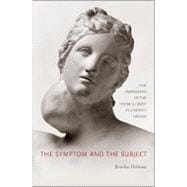
Note: Supplemental materials are not guaranteed with Rental or Used book purchases.
Purchase Benefits
What is included with this book?
| Preface and Acknowledgments | p. ix |
| Abbreviations | p. xiii |
| Note on Transliterations and Translations | p. xxiii |
| Introduction | p. 1 |
| Symptoms and Subjects | p. 1 |
| Seeing through Symptoms | p. 9 |
| The Physical Imagination | p. 19 |
| Rethinking Soma and Psukhe | p. 29 |
| Telling Stories | p. 37 |
| Before the Physical Body | p. 41 |
| Daemonic Violence | p. 48 |
| The Seen and the Felt | p. 58 |
| The Boundaries of the Felt | p. 64 |
| Fear and the Visual Field of the Self | p. 69 |
| How Gods Act | p. 73 |
| The Seen Body and Social Agency | p. 76 |
| Interpreting Disease and Practices of Healing | p. 79 |
| The Inquiry into Nature and the Physical Imagination | p. 84 |
| Depersonalizing Causes | p. 90 |
| Natural Justice | p. 95 |
| Melissus and the Denial of Body | p. 101 |
| A Community of Objects | p. 108 |
| Bodies, Persons, Knowledge | p. 116 |
| Incorporating the Daemonic | p. 121 |
| Symptoms at the Threshold of Seen and Unseen | p. 126 |
| The Interval | p. 130 |
| Explaining Disease | p. 133 |
| The Dynamics of the Cavity | p. 138 |
| The Automatic Body | p. 142 |
| Signs of Life and Techniques of Taking Care | p. 148 |
| The Prognostic Symptom: Forces of Life and Death | p. 150 |
| Fragile Life | p. 156 |
| On Ancient Medicine and the Discovery of Human Nature | p. 162 |
| Embodiment, Knowledge, and Technical Agency | p. 171 |
| Taking Care | p. 177 |
| Shoring Up the Self | p. 182 |
| Beyond the Soma: Therapies of the Psukhe | p. 192 |
| Bodily Needs | p. 196 |
| Psychic Desires | p. 202 |
| Gorgias's Encomium to Helen and Human Diseases | p. 211 |
| Psychic Disorder in Democritus | p. 216 |
| Forces of Nature, Acts of Gods: Euripides' Symptoms | p. 228 |
| The Polysemy of the Symptom | p. 233 |
| Tragedy and the Interval | p. 239 |
| Euripides' Causes: The Madness of Heracles | p. 242 |
| Euripides' Causes: The Madness of Orestes | p. 246 |
| Realizing Disease in the Hippolytus | p. 252 |
| Daemonic Phusis | p. 260 |
| The Semantics of Suffering | p. 265 |
| Conclusion | p. 275 |
| Bibliography | p. 281 |
| Index Locorum | p. 325 |
| General Index | p. 349 |
| Table of Contents provided by Ingram. All Rights Reserved. |
The New copy of this book will include any supplemental materials advertised. Please check the title of the book to determine if it should include any access cards, study guides, lab manuals, CDs, etc.
The Used, Rental and eBook copies of this book are not guaranteed to include any supplemental materials. Typically, only the book itself is included. This is true even if the title states it includes any access cards, study guides, lab manuals, CDs, etc.